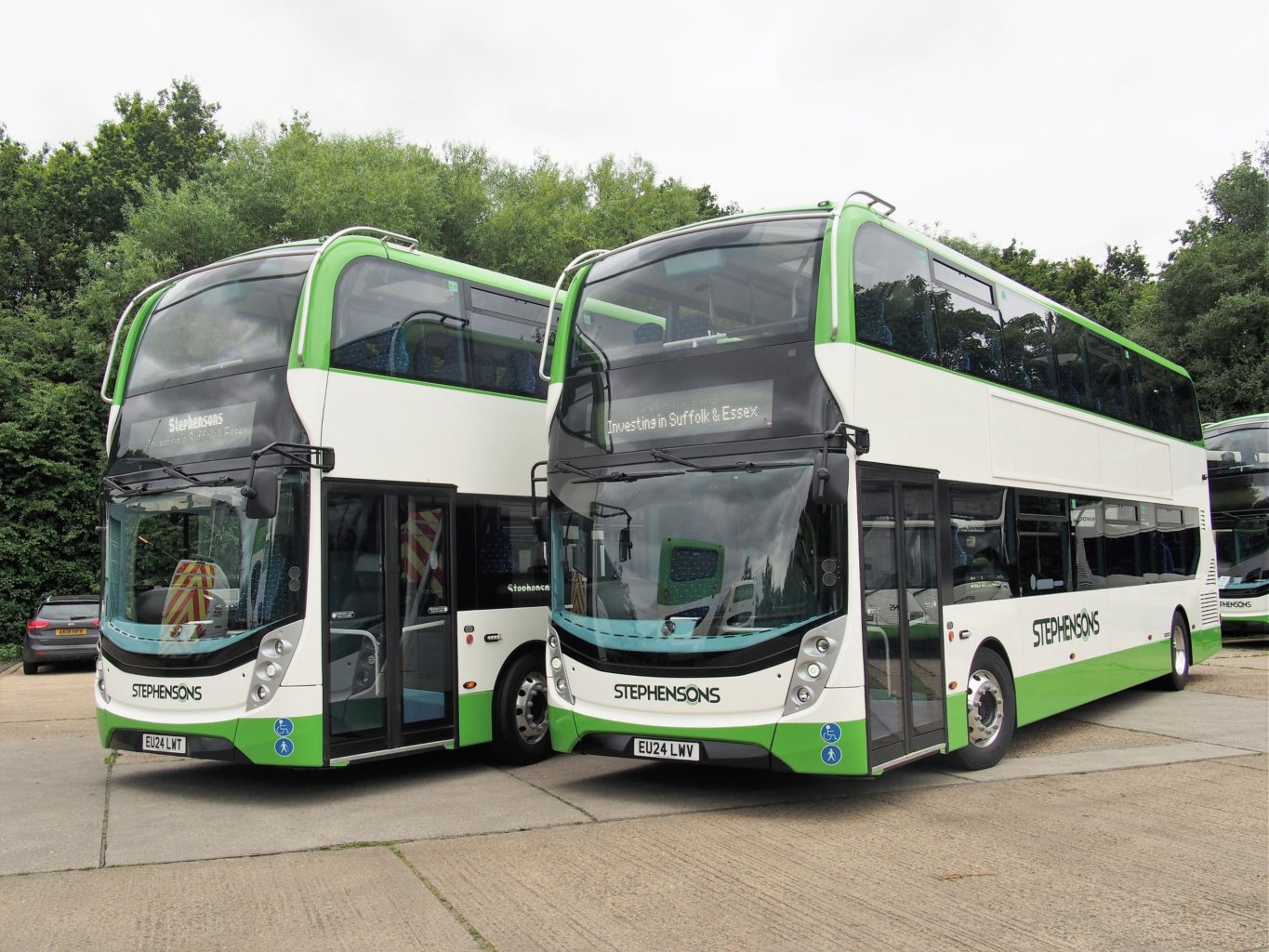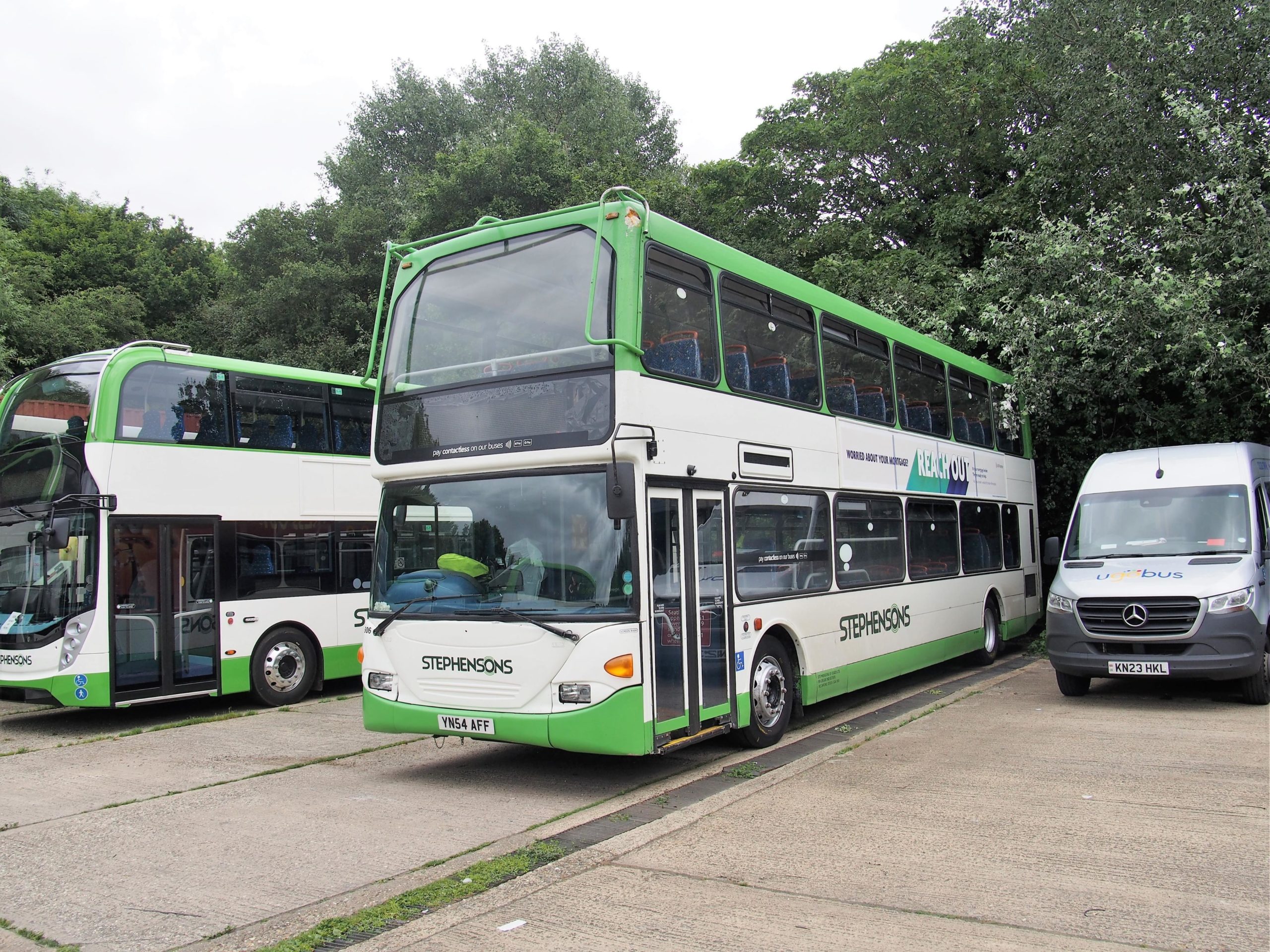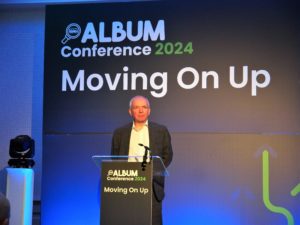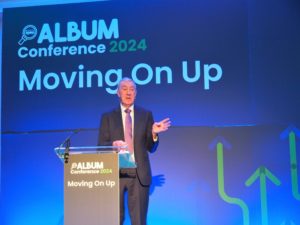Our Chair Bill Hiron, recently met with Coach and Bus Buyer, and we are delighted to share their article below; it can be found directly here: https://www.busandcoachbuyer.com/leading-the-industry/
There are few who would deny Bill Hiron is an industry veteran. If the extensive list of senior positions at bus companies since the ’80s doesn’t convince you of his eminence, then perhaps his recently awarded MBE for services to public transport will. Speaking to B&CB, the Stephensons of Essex Chief Executive and ALBUM Chair, said of this accolade: “It was a huge honour and a great surprise. I knew nothing about it until four weeks before I got it. I’d been nominated by my ALBUM colleagues.”
Bill is a man very much focused on the current issues surrounding the industry, but this award provides a good opportunity to reflect on his career, which all started with a degree in Transport Management and Planning at Loughborough University. It was a four-year course, with the third year in industry, which in Bill’s case was spent at Trent Motor Traction, still part of the National Bus Company at the time. “I was a management trainee. It was really good fun,” he recalls. “I learnt a lot there and when it came time to apply for a proper job, one application was for a senior management training scheme with the National Bus Company.”
He won a place on the two-year scheme in 1985, which took him to the Cheltenham and Gloucester Omnibus Co. “You had no choice where you went; the rumour was they sent you as far away as possible,” said Bill.
The company he joined was new, having just split off from Bristol Omnibus Company. Bill said: “It was a young management team, and they were very progressive.”
At this point, the graduate training scheme had been condensed from two years to 18 months. At the end of it, he was appointed manager at one of the biggest depots.
This was the time of deregulation and, not long after Bill’s joining of the company, there was a management buyout in which he took part, having just become a District Manager. Western Travel was the holding company.
Swashbuckling deregulation
Bill’s next move was to Midland Red South, a new addition to Western Travel, where he became MD in 1990. “It was brilliant fun,” he said.
“Those early days of deregulation were a very swashbuckling time, we felt like we had thrown off the shackles of the regulated world. We could achieve things quickly.”
Western Travel was taken over by Stagecoach in ’93, seeing Bill transition to Brian Souter’s growing empire, working there for six months.
It was then that Bill received a mystery phone call, asking him to work as an MD for Badgerline Group. After discussions, he said ‘yes’ and took the reins at Thamesway in Essex. “Then First Group happened,” he said. This saw Badgerline become part of First in 1995, with Thamesway and sister operation Eastern National combining again to become First Essex.

Stephensons of Essex has recently received a batch of Alexander Dennis Enviro400s, two of which are pictured here
He became MD of First’s Eastern Counties division, then MD for East Anglia, looking after Essex and Eastern Counties, and finally a Divisional Director, adding Leicester and Northampton to his portfolio. Added Bill: “My boss at that time was Peter (now Lord) Hendy – and he’s an inspirational character to work with. Another one from whom I learned a lot.”
In 2000 he moved on and undertook a variety of challenges, including helping rescue the Stratford Blue brand and working part-time with Tellings Golden Miller. He had mixed feelings about departing First, having left behind one of his favourite tasks; running the graduate training scheme.
A year later began his involvement with Stephensons of Essex, then owned by John Stephenson and Lyn Watson. At the time, the operation was mainly focused on private hire coach business. Bill said: “I said to Lyn: ‘I do buses, not coaches’. But they persuaded me, and I took John’s two-thirds shareholding.”
Alongside that, Bill carried on doing work with Stephen Telling. He also became MD of University Bus (later to be known as Uno Bus) in Hertfordshire. He remained a non-executive Director at Uno Bus until Covid.
“Through a combination of luck, and some more luck, and perhaps a little skill, we began winning tenders”
On his time at Stephensons, Bill said: “Through a combination of luck, and some more luck, and perhaps a little skill, we began winning tenders. We’ve grown dramatically and we’ve acquired businesses that were on the edge of falling over. We now operate nearly 140 buses.”
Among the acquisitions have been the routes of Phoenix Student Travel, Fargo Coachlines, Yellow Star Travel (formerly Burton’s Coaches – the remnants of this company can be found at Stephensons’ Haverhill depot) and New Horizon of Colchester. The latter gave up coaching during the pandemic, with Stephensons taking over its home-to-school services. It also took over NIBS Buses based in Wickford, Essex, in 2018. The latter trades under the NIBS name and is still a separate business, keeping its red and yellow livery.

Scanias are a popular make and model at Stephensons of Essex
A couple of years ago, Stephensons expanded into Cambridgeshire, running a mix of tendered and commercial services from both the Haverhill depot, and Ely-based Greys Coaches’ depot. Altogether, the combined Stephensons and NIBS businesses operate from nine sites, covering services in east Cambridgeshire, Suffolk, Hertfordshire and Essex, as well as the Southend unitary authority. There’s a mix of business, including commercial and tendered local bus, rail replacement and home-to-school work. It does not operate coaches, but Bill has a separate coach business. He said: “Coaches are a very different beast to buses. It needs a different skill set to run and they don’t mix very well. In my experience over the years, they’re best not combined, and my background is in buses. It’s harder to make money out of coaches, it’s a far more unpredictable business.”
Looking back at his career, Bill remarked how lucky he is to have been in the industry during the start of the deregulated era: “It was an amazing chance to challenge the norm and be there during the minibus revolution. Recruitment was completely revolutionised with minibuses; it was easier to get people to drive 16-seaters as there was the perception they were less challenging to handle. At that time, there was a whole new breed of driver coming in from the retail and service industries, most with no driving backgrounds.
“We could do things like hail and ride and simple fare zones and suddenly you could market this stuff; all sorts of whizzy liveries appeared. Particularly for me at the time, a young whipper-snapper know-it-all, it was very exciting. I was very fortunate to have learnt from some of the very best in the industry.
“This industry requires a number of different skill sets; so that’s why I was keen to work on and very much enjoyed the graduate training scheme. Having been on it myself ten to 15 years earlier, it was great to pass on some of that knowledge.
“Stagecoach and First both had flourishing graduate training schemes, which followed the model of the National Bus Company.”
Chairing ALBUM
In some ways, Bill continues to help pass on knowledge and insight via ALBUM, being the current Chairman. The group’s origins lie in a gathering of municipal operators, but as their numbers declined it was decided in the early 2000s that membership would be widened to the independent sector. “I became a member of ALBUM in around 2010, and that was very worthwhile,” said Bill.

Bill welcoming delegates to the annual ALBUM conference in April this year
ALBUM is very busy currently, he reports: “With the new government, we’ve got a lot of work to do highlighting the issues affecting SMEs. We don’t try and emulate what the CPT is doing, we concentrate on the problems from an SME perspective rather than an industry-wide position, although many issues are aligned across both sectors. We are extremely fortunate to have found a new administrator in Andrew Halliday – formerly MD of Safeguard Coaches – to take over from our stalwart for the last five years, Allan Edmondson. He understands buses as well as anyone does.”
In terms of the impact of ALBUM for its members, Bill said: “In recent times one of the most frantic periods for ALBUM was during Covid, as things moved very fast, day by day. As Chair I was having meetings with the DfT and CPT and passing on the latest messaging. We were having weekly Zoom meetings with our MD group, disseminating knowledge and sharing and learning from others on how they worked around problems.
“Those meetings were very useful. They were almost like a comfort blanket as many bus operators in the SME sector felt isolated. It was beneficial for them to have that weekly conversation.”
There is a great camaraderie among ALBUM members, Bill says: “It’s like a family. It’s business led, but there is a social aspect to it.”
As operators settled back into a more regular, busy routine post-pandemic, the weekly ALBUM Zoom meetings inevitably dropped to a monthly frequency. The group also still meets in person, twice a year and at the annual ALBUM conference. There are also regular meetings of separate groups, including operations/commercial, marketing, and a newly re-invigorated engineering group. There is additionally a supplier membership section of the organisation, represented on the Board, which has grown in the last few years.
The major task ahead for ALBUM is to ensure the government is up to speed with the industry. From the organisation’s point of view in particular, it is to ensure politicians understand that smaller bus businesses are a very important part of the market. Bill said: “Traditional independents are a key part of the community they serve. Their owners and managers live locally and employ staff locally, they are as close to their customers as any business can be. And of course, their supply chain is as local as possible in most cases too. We have to be very careful we don’t lose all that by changing the regulatory framework so that it’s very hard for SMEs to continue in the market.”
Challenging franchising
And changes to the way buses are governed could be likely, with interest in franchising not abating. “This is a huge danger for SME operators,” Bill said. “If you look at Manchester, the independent sector has been wiped out. And even in London, one of the sole remaining SMEs operating tenders for TfL has just pulled out of the capital.
“The challenge is to help government understand franchising is not appropriate everywhere”
“And there are even bigger dangers outside Manchester, where SMEs make up a bigger proportion of the market. The challenge is to help government understand franchising is not appropriate everywhere. SMEs have to have a way of being part of the market going forward.”
He says there are big question marks over where the money for franchising will come from. As well as the financial risk of local authorities controlling the bus network. He also doesn’t believe local authorities all have the skills to set up and manage a franchised network. He said: “On top of that, it will be much more challenging in rural areas, where it’s questionable whether franchising would bring about anything different to what we already have. In a shire county, it’s much less relevant than a big urban area; there’s not the same degree of interchange. The only way of making significant improvements is to throw a lot of money at it.
“The real challenge is getting politicians to prioritise passengers [over vehicles], andw to implement bus priority measures. What politicians want isn’t always what passengers want. One of our challenges is to get the government to understand things that are done behind the scenes.
“Giving greater local control can mean all sorts of things, not just franchising. In a lot of areas, there are a lot more cost-effective ways of achieving better buses than franchising. And there are a lot of different ways of doing franchising other than what’s happening in Manchester.
“Money will be a big constraint in all of this. Manchester had money from all sorts of different pots. That sort of funding will not be repeated. I’m very much of the opinion that working along the lines of Enhanced Partnerships, perhaps with modifications; that’s probably a lot more appealing.”
Many local authorities might agree, he believes: “Outside of the big metropolitan areas, a lot of shire counties and unitary authorities are, in reality, not at all enthusiastic about franchising. It will be interesting to see how Manchester works out.”

ALBUM’s hugely experienced Policy Advisor, Tony Depledge, speaks during this year’s ALBUM Conference
Bill says there is work to be done to build back passengers post-pandemic: “To make buses more attractive we will have to get the local authorities onboard. We need better reliability whatever model is rolled out.”
To help drive home ALBUM’s message to government, Bill and ALBUM’s hugely experienced Policy Advisor, Tony Depledge, have already met with Simon Lightwood when he was Parliamentary Under-Secretary of State for Local Transport, and are seeking to meet him again soon in his new role. ALBUM Vice-Chair David Astill recently hosted him on a visit to Nottingham City Transport – a proud ALBUM member. Bill said: “Buses traditionally haven’t been in the headlines, so in some ways having that higher profile is good. But it is a bit of a double-edged sword.”
He continued: “The industry faces all sorts of challenges, but ALBUM is more invigorated now than it has been for some time. It’s a very lively and dynamic group of people. Generally, we find ourselves in agreement with what we discuss. It’s a real pleasure to be the ALBUM Chair.”